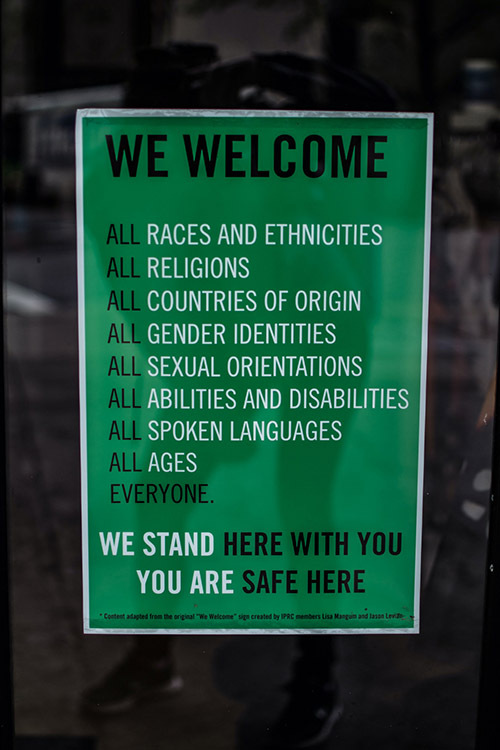- Winter 2022
- A fifth pillar for CPD: Embedding Barristers Rule 123 in our annual learning
A fifth pillar for CPD: Embedding Barristers Rule 123 in our annual learning

On 26 May 2022, Bar Council unanimously approvedba recommendation made jointly by the New Barristers Committee and the Diversity and Equality Committee, and with the support of Education Committee, to endorse a change to the Uniform Law Scheme to require all barristers to do at least one hour of CPD training on anti-discrimination, harassment and bullying every year.
The resolution
The primary element of the resolution was as follows:
RESOLVED to endorse amendment of the Legal Profession Uniform Continuing Professional Development (Barristers) Rules 2015 (NSW) [Barristers’ CPD Rules], with effect from the 2023-2024 CPD year, to the following effect:
9 Categories of CPD
(1) A barrister must, unless otherwise exempted, in each CPD year engage in CPD activities in each of the categories set out below—
a. Ethics and Professional Responsibility,
b. Practice Management and Business Skills,
c. Substantive Law, Practice and Procedure, and Evidence,
d. Barristers’ Skills,
e. Anti-Discrimination, Harassment and Bullying.
The amendment would insert sub-paragraph (e) after the already-existing (a)–(d), and so add ‘Anti-Discrimination, Harassment and Bullying’ as a fifth ‘pillar’ of barristers’ annual CPD requirements. The title and content of this pillar is taken from Uniform Professional Conduct (Barristers) Rules 2015 (NSW) (Barristers’ Conduct Rules) r 123.

The further process before incorporation into the Uniform Law scheme
In order to become part of the Uniform Law scheme, the proposal needs to go through several further stages. The Bar Council has commended it to the Australian Bar Association (and to the Victorian Bar Council and the Council of the Western Australian Bar Association, as fellow Uniform Law states). The Australian Bar Association formally develops proposed changes to the Barristers’ CPD Rules and, in doing so, consults with the Legal Services Council and the commissioner for Uniform Legal Services, and with the Bar Councils of Uniform Law states. Such draft changes are then open to public consultation for a period of time, following which the changes, including any amendments, are formally proposed by the Australian Bar Association to the Legal Services Council. The Legal Services Council refers the proposal to the standing committee of attorneys-general of the Uniform Law states who have a limited period in which to veto the proposal, and on limited grounds. Unless thus vetoed, the changes are formally adopted by the Legal Services Council and become part of the Barristers’ CPD Rules in each Uniform Law state. The entire process generally takes around six to eight months.
TWO BARRISTERS'S VIEWS ON WHY THEY MADE THIS PROPOSAL TO BAR COUNCIL
Below, two of the proponents of the motion share their views on it. The views expressed are the authors own, and do not necessarily represent the view of Bar Council or any of its individual members.
David J. Townsend, New Barristers Committee

Why is this important to you?
As a barrister who commenced practice in 2020 – what was thought to be ‘The COVID Year’, but ended up becoming just ‘COVID Year One’ – I thought a lot about what kind of profession I was entering, and what kind of profession I’d like it to be in the future.
One of the major issues which our profession has had to face up to in recent years has been instances of discrimination, harassment and bullying which have come to light. The fact that some of these were ‘time bombs’ which only went off when enough individual complainants became aware of each others’ experiences and took action against it was all the more concerning.
Most barristers I spoke to seemed to be generally aware that there was a provision of the Barristers’ Conduct Rules which forbade bullying, discrimination and harassment, but not infrequently the attitude seemed to be ‘Yes, there’s probably something in the Barristers’ Conduct Rules about this – somewhere towards the back – but I already know that barristers shouldn’t do this sort of thing, and I never would anyway’. I didn’t doubt the sincerity of this sentiment, but it struck me that the majority of persons ‘involved’ (in the broad sense) in conduct that might amount to discrimination, harassment or bullying were neither the perpetrator nor the victim, but were bystanders, professional colleagues, floormates and the like, who were persons of good will but who might not have the necessary knowledge to prevent, interrupt or report the conduct. I wanted to do something to make sure that every barrister who practised in NSW (and indeed the other Uniform Law states) would have a better awareness of the ways that they can identify and confront discrimination, harassment and bullying. I didn’t want bystanders to just stand by.
How does this fit in with other work the Bar Association has done?
The Bar Association has created detailed best practice guidelines on harassment, discrimination and bullying, including a model framework for grievance and complaints, and in October 2021 we witnessed some very powerful statements from the then-chief justice of NSW and then-president of the Bar Association about the unacceptability of conduct which breaches Barristers’ Conduct Rules r 123.
My hope is that, by establishing r 123 as a pillar of our annual CPD requirements, such that every barrister will need to certify that they have done at least one hour’s worth of CPD activity in that pillar, more barristers would be spurred to spend time familiarising themselves with these best practice guidelines, and it would help to embed knowledge of them in our profession. Of note is that South Australia and Tasmania (which are not part of the Uniform Law scheme) have already added extra ‘pillars’ to their annual CPD requirements as of the 2021–22 CPD Year. In both cases the new pillar either was, or encompassed, ‘anti-discrimination, harassment and bullying’.
Does this act on a presumption that barristers are generally breaching Rule 123? Absolutely not. We already have, for instance, a requirement to obtain one CPD point in ethics & professional responsibility each year, and the existence of that requirement doesn’t mean that we are otherwise all presumptively unethical and professionally irresponsible. The same is true for the other three existing pillars of CPD requirements. The existence of these several pillars simply recognises that we are a learnèd profession: all learning requires constant maintenance and advancement, and all professionalism commits itself to the improvement of the profession itself.
If adopted, would this mean I have to do more CPD hours?
No. The existing requirement to obtain 10 CPD points would remain undisturbed. All this proposal would do is add a fifth pillar within the 10-point structure, so a barrister would need one point in each of the five pillars, and then would be free to complete the remaining five points from any combination of pillars.
How would I prove I have got my CPD point in anti-discrimination, harassment and bullying?
The same way as for the existing aspects of the annual CPD requirements: when you apply for the following year’s practising certificate, you would self-certify compliance with the Barristers’ CPD Rules, and you would be required to keep records of your CPD activity.
What kind of activities would qualify to gain a CPD point in this fifth pillar?
In addition to attending CPD seminars the content of which deals with anti- discrimination, harassment and bullying, just as for the other pillars it would be possible to gain a CPD point through other forms of educational activity, such as writing an article, delivering CPD training, and private study of audio/visual material. There already exist dozens of recorded CPDs on the Bar Association website which are likely to suffice to obtain a CPD point in anti-discrimination, harassment and bullying. These are available to view for free, at any time. Time spent in careful study of the best practice guidelines is also likely to also qualify for a CPD point in this pillar as well.
How can I have my say on the adoption of this change?
If, as the Bar Council has commended, the Australian Bar Association indeed puts this forward as a proposed change to the Barristers’ CPD Rules, it will remain open for a public consultation period of at least 30 days (Legal Profession Uniform Law (NSW) s 427(5)(b)). Written submissions received in this period are considered before the further progress of the proposal.
Elly Phelan, New Barristers Committee and Diversity & Equality Committee

Why do you think this is important?
I think this CPD change is important because it reflects the high standards to which we are held as barristers and as a profession. It is unfortunate that the legal profession has been marred by discrimination, harassment, and bullying over recent years. I know our profession is better than that and I also know that the Bar Association is committed to stamping out these behaviours.
The CPD change will ensure all members of the bar are aware of Rule 123 as recently amended, as well as the various types of behaviour that are prohibited by the rule. I believe these issues need to be addressed collectively by all of us and that is the only way to effect real cultural change.
I also note that this change is not a totally new requirement, as the former Legal Profession Regulation 2005 (NSW) r 176 mandated that one CLE point (as CPDs were then termed) be obtained in anti-discrimination and harassment (and related matters) every three years. It appears that inadvertently this was not carried over into the contemporary annual CPD system under the Uniform Law scheme.
I can also say that the importance of this change is demonstrated by the strong support from the bar. The proposal to Bar Council had strong support from three committees: the Diversity & Equality Committee, the New Barristers Committee, and the Education Committee. I am grateful to the members of those committees for their support and input.
How will this improve diversity and equality at the bar?
It is important that the bar remains a welcoming place for all. If we want the bar to remain a profession that attracts the best and brightest of the legal profession, we need to ensure that once those people are called to the bar, they are not subject to discrimination, harassment, and bullying, and that these behaviours are called out by members of the bar for being inappropriate. This change to the CPD requirements will ensure that Rule 123 is front of mind for all of us, and importantly, that we know both how to respond if we witness such behaviour and how to be an effective bystander. Annual CPD training in this area will also ensure we are kept abreast of actions and measures being taken by the Bar Association, such as the recent launch of the Spot platform and the appointment of the bar’s sexual harassment officer.
How does this fit in with larger movements in the profession, including internationally?
This change would bring New South Wales, Victoria and WA into line with other Australian jurisdictions, including South Australia and Tasmania.
Internationally, the International Bar Association’s landmark 2019 report Us Too? highlighted the prevalence of unacceptable workplace behaviour within the profession and found, alarmingly, that 1-in-2 females had experienced sexual harassment, as had 1-in-8 males. This week, the International Bar Association published two new reports, which indicated that despite the mechanisms for complaints being implemented, people are still not reporting.
Rules such as Rule 123 and complaint mechanisms can only be effective if they are accompanied with appropriate education and training in how to use them. This change to CPD requirements would support that, and New South Wales and the other Uniform Law states would be demonstrating to the world that they are serious about stamping out discrimination, harassment, and bullying. BN
